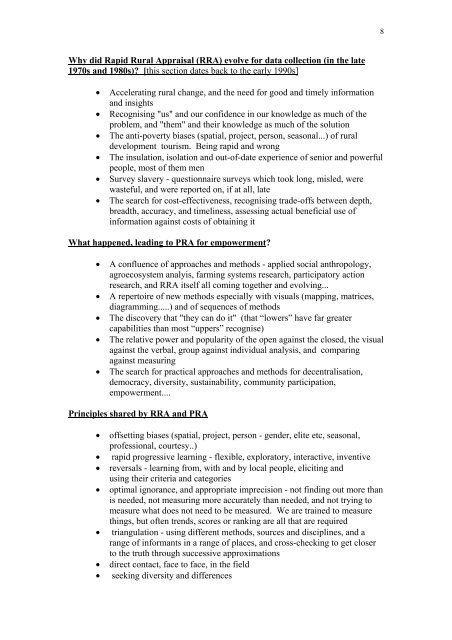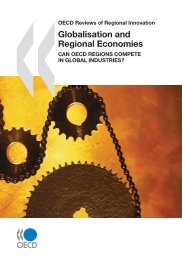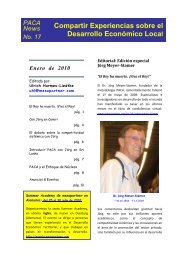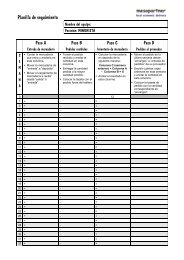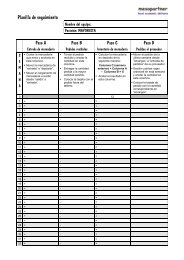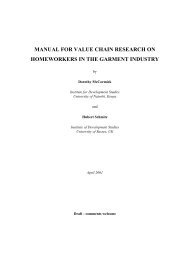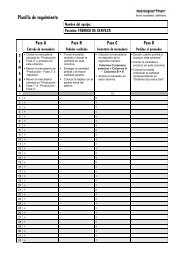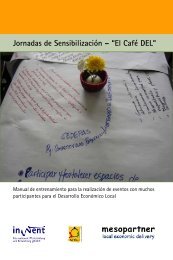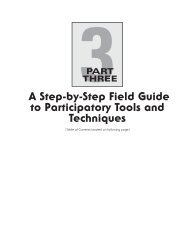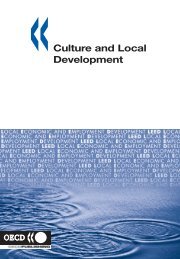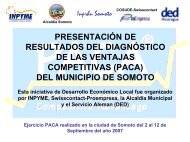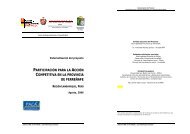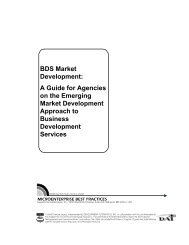R Chambers - Notes for participants in PRA-PLA course.pdf - PACA
R Chambers - Notes for participants in PRA-PLA course.pdf - PACA
R Chambers - Notes for participants in PRA-PLA course.pdf - PACA
Create successful ePaper yourself
Turn your PDF publications into a flip-book with our unique Google optimized e-Paper software.
8<br />
Why did Rapid Rural Appraisal (RRA) evolve <strong>for</strong> data collection (<strong>in</strong> the late<br />
1970s and 1980s)? [this section dates back to the early 1990s]<br />
• Accelerat<strong>in</strong>g rural change, and the need <strong>for</strong> good and timely <strong>in</strong><strong>for</strong>mation<br />
and <strong>in</strong>sights<br />
• Recognis<strong>in</strong>g "us" and our confidence <strong>in</strong> our knowledge as much of the<br />
problem, and "them" and their knowledge as much of the solution<br />
• The anti-poverty biases (spatial, project, person, seasonal...) of rural<br />
development tourism. Be<strong>in</strong>g rapid and wrong<br />
• The <strong>in</strong>sulation, isolation and out-of-date experience of senior and powerful<br />
people, most of them men<br />
• Survey slavery - questionnaire surveys which took long, misled, were<br />
wasteful, and were reported on, if at all, late<br />
• The search <strong>for</strong> cost-effectiveness, recognis<strong>in</strong>g trade-offs between depth,<br />
breadth, accuracy, and timel<strong>in</strong>ess, assess<strong>in</strong>g actual beneficial use of<br />
<strong>in</strong><strong>for</strong>mation aga<strong>in</strong>st costs of obta<strong>in</strong><strong>in</strong>g it<br />
What happened, lead<strong>in</strong>g to <strong>PRA</strong> <strong>for</strong> empowerment?<br />
• A confluence of approaches and methods - applied social anthropology,<br />
agroecosystem analyis, farm<strong>in</strong>g systems research, participatory action<br />
research, and RRA itself all com<strong>in</strong>g together and evolv<strong>in</strong>g...<br />
• A repertoire of new methods especially with visuals (mapp<strong>in</strong>g, matrices,<br />
diagramm<strong>in</strong>g.....) and of sequences of methods<br />
• The discovery that "they can do it" (that “lowers” have far greater<br />
capabilities than most “uppers” recognise)<br />
• The relative power and popularity of the open aga<strong>in</strong>st the closed, the visual<br />
aga<strong>in</strong>st the verbal, group aga<strong>in</strong>st <strong>in</strong>dividual analysis, and compar<strong>in</strong>g<br />
aga<strong>in</strong>st measur<strong>in</strong>g<br />
• The search <strong>for</strong> practical approaches and methods <strong>for</strong> decentralisation,<br />
democracy, diversity, susta<strong>in</strong>ability, community participation,<br />
empowerment....<br />
Pr<strong>in</strong>ciples shared by RRA and <strong>PRA</strong><br />
• offsett<strong>in</strong>g biases (spatial, project, person - gender, elite etc, seasonal,<br />
professional, courtesy..)<br />
• rapid progressive learn<strong>in</strong>g - flexible, exploratory, <strong>in</strong>teractive, <strong>in</strong>ventive<br />
• reversals - learn<strong>in</strong>g from, with and by local people, elicit<strong>in</strong>g and<br />
us<strong>in</strong>g their criteria and categories<br />
• optimal ignorance, and appropriate imprecision - not f<strong>in</strong>d<strong>in</strong>g out more than<br />
is needed, not measur<strong>in</strong>g more accurately than needed, and not try<strong>in</strong>g to<br />
measure what does not need to be measured. We are tra<strong>in</strong>ed to measure<br />
th<strong>in</strong>gs, but often trends, scores or rank<strong>in</strong>g are all that are required<br />
• triangulation - us<strong>in</strong>g different methods, sources and discipl<strong>in</strong>es, and a<br />
range of <strong>in</strong><strong>for</strong>mants <strong>in</strong> a range of places, and cross-check<strong>in</strong>g to get closer<br />
to the truth through successive approximations<br />
• direct contact, face to face, <strong>in</strong> the field<br />
• seek<strong>in</strong>g diversity and differences


